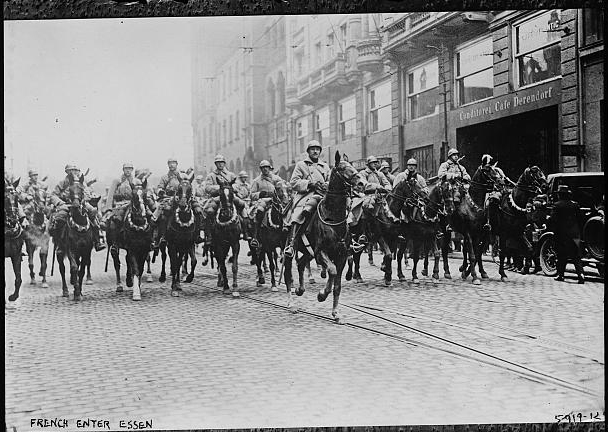French troops move to occupy German Ruhr region amid claims of a reparations default
The Ruhr, 16 January 1923 - The French army has in recent days moved to take occupation of the Ruhr region of Germany.
The French premier, Raymond Poincare, has defended the action in the French chamber on the grounds that Germany had defaulted from its reparations responsibilities under the Versailles Treaty in terms of coal and wood deliveries.
Monsieur Poincare said that France did not desire to act outside the Treaty of Versailles and had only entered Essen and the Ruhr to defend the joint interests of the Allies. He added, too, that France was not acting alone, but with the support of Belgian and Italian engineers.
Germany has decreed the Franco-Belgian action as a breach of the treaty which, it claims, makes no allowance for territorial sanctions. It is being reported that the German government will, once the French occupation becomes established, declare the Peace Treaty to be broken and will no longer negotiate with the Reparations Commission.
British Pathé of Ruhr valley occupied by 40,000 French troops including armoured cars, cavalry batteries of artillery and tanks. Germany.
The Ruhr represents the heart of the German coal industry and since the invasion mine owners in the occupied territory have met with the French Economic Mission.
A Press Association report from Essen noted that the French demand is that the Germans should produce the total coal deliveries stipulated by the Reparations Commission. As long as that was delivered France would consider its mission achieved and would take no interest in the coal tax (40%) which has until now been collected by the German government.
So far, the French have been met with only passive resistance. A half hour stoppage of all work in Essen was observed in protest at the French occupation and miners in the region have refused to work overtime. There have also been reports of bouts of patriotic German singing and anti-French demonstrations. However, the German government has also acted to refuse permission for coal deliveries to France, a move that prompted a further Franco-Belgian advance in the region. Any confiscation of the mines by the French would, the Germans believe, have the effect of ruining the Ruhr and will have the spillover consequence of ruining the region of Alsace-Lorraine which draws most of its supplies from the Ruhr.
Speaking in Washington, the U.S. Ambassador to Britain, George Harvey, has said that there is ‘no telling what may result from the occupation of the Ruhr, and nobody can tell from day to day what is going to happen.’ Mr. Harvey also remarked that the United States was better off out of the ‘whole European mess. It is lucky that we are not in the League of Nations.’
[Editor's note: This is an article from Century Ireland, a fortnightly online newspaper, written from the perspective of a journalist 100 years ago, based on news reports of the time.]





















